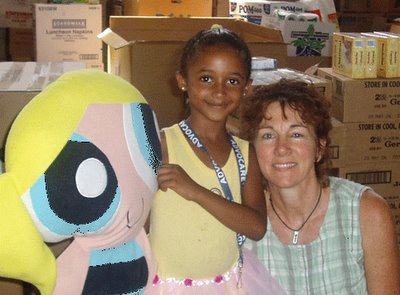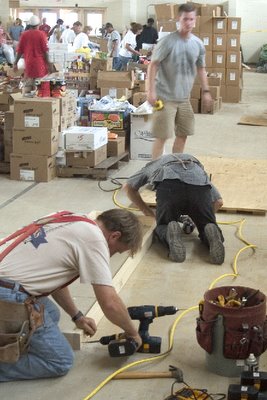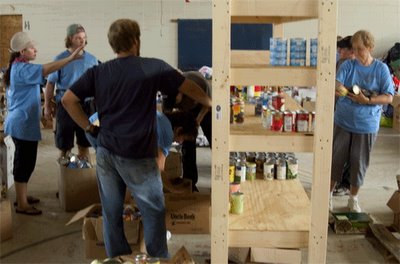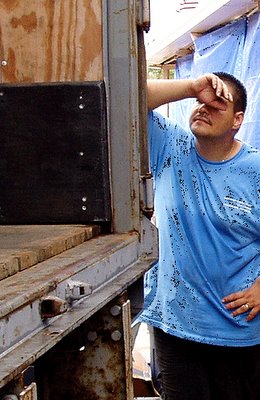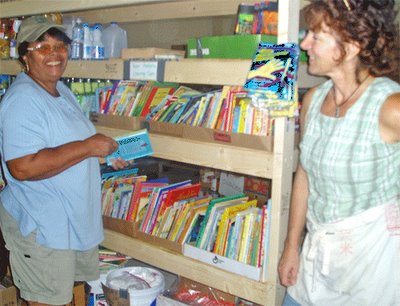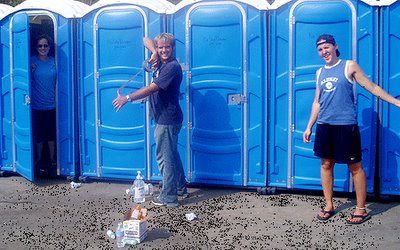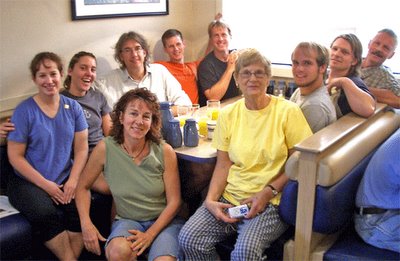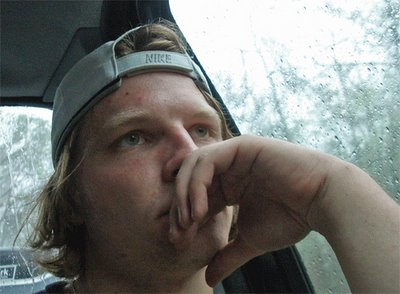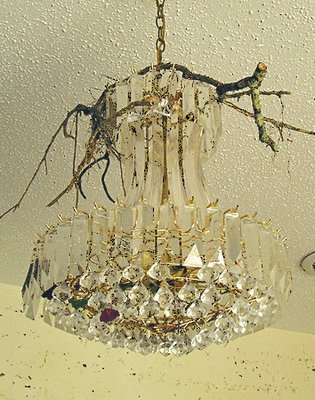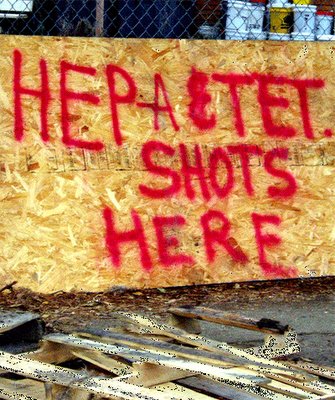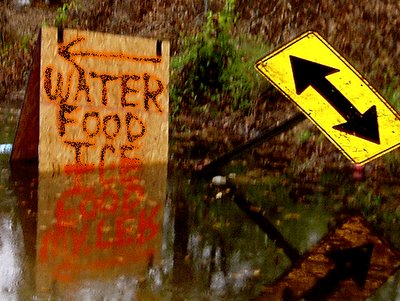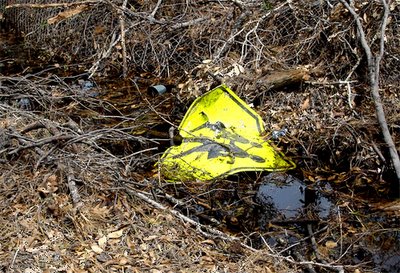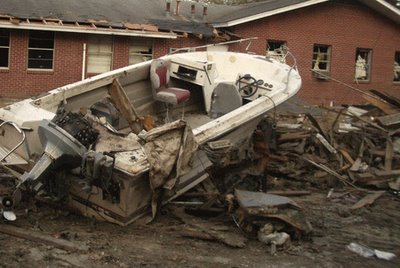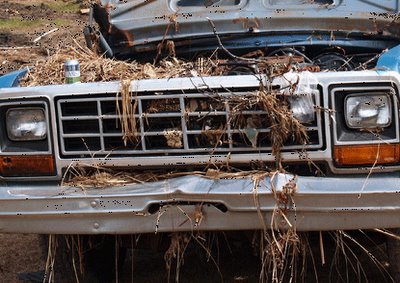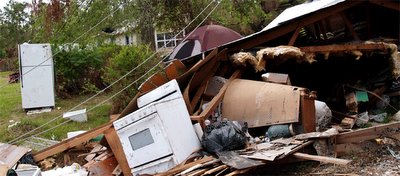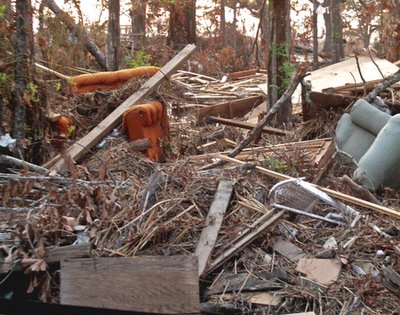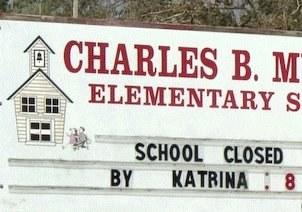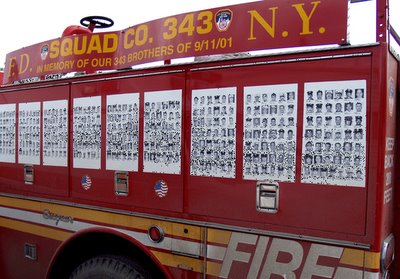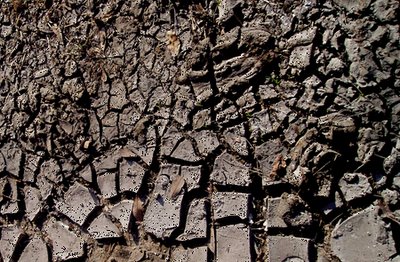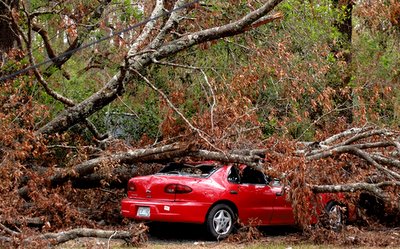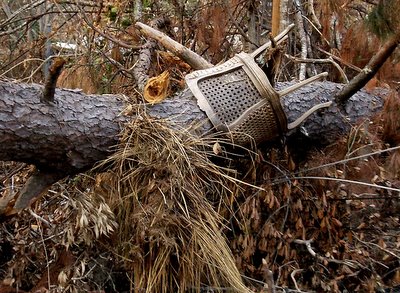(a continuation of the story begun in "The Path to Pearlington" (see below))
It is now Sunday, two days after the unplanned trip to this town I did not know of ...but which God did. I am now heading back, this time with a team from my home church, Bethlehem Baptist in Minneapolis, that has just driven 1200 miles through the night, not knowing where they were coming to help ...but which God did. As we drive from Baton Rouge to Pearlington, we do not know what we will be doing when we get there ...but I'm sure God does.
We head, first, to see Buzzy and Grady. It's good to see them again. They're like old friends even though we just met 2 days ago. They've made some improvements to their front yard camp ground, although it is not really a yard any more. It's mostly just dried mud.
I make introductions and then ask Buzzy and Grady if they could tell us what things we should look out for while here. They say the snakes and the crocodiles have, supposedly, all gone further inland as they don't like salt water. They told how the black mold on the insides of homes is more dangerous than the other color molds. Who needs government sanctioned orientations when there are Buzzys and Gradys on site?
We then head over to the distribution center, located in the elementary school gym. There, I spot Jon (later to become known as "Canada Jon"). I go over to him and tell of the team that has come. A big smile sweeps across his face. Neither of us need to say anything more.
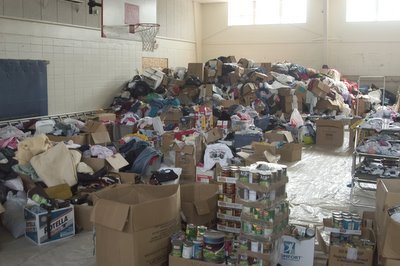
The shelf-less distribution center when we arrived
In the evening, we head over to Hebron Baptist, the church from which, on Friday, God directed Tom Eckblad and I to Pearlington, and to which, in an only-God way, He brought us back to that night. It was clear this was the place God had for the team to stay while working in Pearlington. As we blow up air matresses and try to fit them into three small rooms, we brainstorm on what we should do the next day in Pearlington.
Knowing there is no one to serve breakfast the next morning, some volunteer to leave early to make breakfast for other volunteers and for the residents that have no place to cook. Others, having seen the organizationally challenged distribution center, decide to start by making shelves and clothes racks to get things off the floor.
I have a less practical idea – create a Mall of America Pearlington, complete with an amusement park in the middle for the kids.
Early Monday morning, some head off to Pearlington to fix and serve breakfast for 100 plus people while others go to get supplies to build shelves, etc. I search for a "car" for the rollercoaster that is to rise in the middle of the mall.
As I look for this "car", I don't find anything that I can justify spending the money on. Then I have an idea: Tom Varno's wheelbarrow the team brought down could be the "car" the kids ride in as someone wheels it up and down ramps made of blocks of wood and plywood. I buy some paint (custom color, of course) and a cheap (war-time mentality) paint brush to transform the wheelbarrow.
There is only one problem with my Mall of America Pearlington vision – I am the only one who seems to have it. Everyone else is intent on making breakfast, building shelves, or organizing the distribution center. No one is volunteering to help build the rollercoaster. I don't think anyone thinks I am really serious - I have this problem sometimes. If they do think I'm serious, they probably are passing it off as being frivolous.
The reality? I am serious about being frivolous. I've spent 2 weeks visiting shelters. I have seen the children, children without their homes, without their toys, without a playground, trying to "be good" while there was nothing to do. The shelters are often just rooms of wall to wall cots.
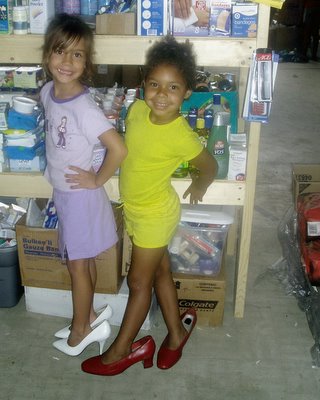 Two children from Pearlington modeling newfound shoes - being frivolous - in the distribution center.
Two children from Pearlington modeling newfound shoes - being frivolous - in the distribution center.
I decide to pursue my idea alone. I get out the custom paint and start painting the wheelbarrow. The more time that passes, however, the more it becomes clear that this rollercoaster is not going to be. The death blow was when the first shelving unit got built and was set right in the middle of the unseen-to-others amusement park. It's obvious no one is "tracking" with me on this rollercoaster idea. I was experiencing what some would call "death of a vision."

The first shelf goes up and the food starts coming off the floor.
I wonder what I should now do. As I have yet to take any photos since coming down, I decide to take a break and drive around the town.
Wow.
I hadn't really seen the town as we had only driven in on the road that led to Buzzy and Grady's and then to the school. This is a town where there is nothing left to live in or work out of. The residents, who are just beginning to return, live in tents pitched in the drying mud in what I assume were yards. Everything has been flooded or blown away or both. There are houses on the streets. One you can drive-thru, as the simplest way to reopen the street was to cut through the middle of the house sitting across it.
I take some photos, but feel uncomfortable doing so. These are people's homes. These are people's personal possessions. I feel like I'm invading their privacy. It wasn't really their intention to have everything in their home washed out onto the streets for others to take pictures of.
Later, as I walk back into the distribution center, I stop to take in the view now in front of me. More shelves have been built (and placed in the amusement park). The team is busy either building more shelves or putting things on the shelves or helping residents find what they need. The "Hope in God" t-shirts the team is wearing are soaked in sweat. Much has been accomplished today.

This photo of the stocked shelving units was taken later in the week
Then, out of nowhere, it hits. As I see the others working away, I also see that my time here is over. I have done what I was called here to do - to prepare the way for others to come. They are here. I can go home. It is a strange mixture of relief and sorrow. Relief in that I can go – I need to, it's pushing 3 weeks – and sorrow that this incredible time is about to end.
I need to work alone. I go over to my rollercoaster car, the wheelbarrow, and re-envision it. If it isn't going to be used as a rollercoaster car for kids, it can be used to deliver groceries from the distribution center to people's cars. I paint a design on the still wet blue paint and add the letters "DFH".
Jon comes by. He is finally leaving. He sees he finally can. The Bethlehem team is here, working, and committed to staying for the whole week. He thanks me.
In his relief that he can now go home, there is also a sorrow. I see it all over his face. We're in the same boat - filled with emotions going in every direction. We need to get away from here, yet we both know the needs are so great we fight the need to leave. Jon and I give each other a big hug and say good-bye. I watch as he walks away and out the door and back to Canada. It's strange. We had hardly talked, yet I fell like I have known him for years. I didn't ask for his address. I already have more addresses than I will ever be able to keep in contact with. But I will never forget him. He will always be "Canada Jon".
It's time to leave. It will soon be curfew time across the Katrina South. As others finish what they are doing, I tell Rachel I am going for a walk and that they can pick me up on the way out. It's my last day here. Tomorrow morning, I'm heading home. I need some time alone. I need some time with God.
As I walk and pray I look at what remains of once majestic trees, trees flooded by salt water, broken and stipped by the winds of the eye of a hurricane. But I'm not seeing trees. I'm seeing an awesome God – a God who can, with a "poof" from his mouth, cause majestic trees to be majestic no more.

It's strange. I remember Saturday morning in the sanctuary of Hebron Baptist reading Psalms 29:
"The voice of the Lord is over the waters... is powerful ...is full of majesty. The voice of the Lord breaks the cedars... shakes the wilderness ...strips the forests bare."
And? All cried over the destruction? No. It does conclude with crying, but of a different sort: "And ...all cry 'Glory!' "
As I look at and through these trees, with the sky behind turning the colors of the sunset, all I can see is beauty. I see an awesome God - a majestic God whose majesty trumps any majesty these trees might have ever claimed. It is as the Psalmist said. It is "Glory!"
As I walk, I see I am coming up on Buzzy and Grady's, but something's wrong. Grady is standing on the side of the road. He sees me coming. There are orange highway cones placed down the middle of the road with a chair strangely placed in the middle of the cones. Before I get there, a police car pulls up. An officer gets out, and calls Grady over. Soon another police car comes. Buzzy comes out. Heated "discussions" begin.
It seems Buzzy had set up his own speed control zone in front of his open camp ground to try to keep down the dust from passing vehicles. The most controversial part of his operation is his sitting in the chair in the middle of the street with a gun and machete. The police, it appears, do not think this is a good way to lessen the dust left from the mud left from the flood. Soon more police cars. And more. The road is now blocked by cars with flashing-lights. I, again, find myself in the middle of something I am not quite sure what or why.
As the police are "talking" with Buzzy, I talk with Grady. He is clearly concerned about what is going to happen to his friend. Grady has done jail time and knows what it is like. Grady had been a drug addict. It is Buzzy who had gotten him off it. Buzzy is his best friend.
As the rest of the team now arrives on the scene looking for me (and wondering what I am in the middle of now), and with the curfew time approaching, I know it is time to interrupt this police operation to do what I had come to do: to tell Buzzy and Grady thanks for the batteries and good-bye. As I shake Buzzy's hand I look him in the eyes and say, "Buzzy, you don't need to be doing this sort of thing." He looks back at me. It is our last words.
I walk with the others back to the waiting vehicles. It is another of-God orchestration - to leave Pearlington as I had arrived – entering the flood ravaged and frustrated lives of two Mississippi men called Buzzy and Grady.
The next day, I hear from my mom that Pearlington has been in the news all day. I look it up on the internet. The story of Pearlington and how it is being overlooked and has gotten little help is being carried across the country and around the world. There is a photo taken inside the distribution center. It was how it looked Sunday – the day we arrived. I smiled.
The world may have overlooked Pearlington, but God hadn't. And He had a plan. We were a part of it. As the sun rose that morning, as people across the country opened their newspapers to read for the first time about this overlooked town, we were, by God's orchestration, already there, in place, cooking and serving breakfast for volunteers and residents, building shelving, sorting and organizing the distribution center
...and painting a wheelbarrow.
While I believe all that we did during our time in Pearlington helped to give people hope, God used the frivolous painting of an old crusty wheelbarrow to show the need is so much more than food and shelter
 The painter and his frivolous wheelbarrow
The painter and his frivolous wheelbarrow
As I painted the wheelbarrow, earlier that day, a man stopped by and just starred. He looked for the longest time and finally said, "I really like that color. What is it? I'd like to paint my porch that color."
Amazing.
In a town that was up to its roofs in water, where dried mud is everywhere – inside and out – in homes, churches, cars, everything, where the landscape has turned a winter-brown in the middle of summer from the salt water, where the trees are twisted and broken, a man starts dreaming about having a front porch again ...and what color to paint it.
Earlier that day, before the death of the rollercoaster, an older man stops by and asks about the wheelbarrow. He would like to use it. I tell him about my idea for a rollercoaster for the kids. He gets this strange look on his face as if he couldn't believe what he had just heard. Then his face gets brighter. He gets this big smile. He says he'll be back later with his two grandkids.
Then, a woman comes by and asks rather indignantly, "What are you doing!?"
I respond, rather sheepishly, "Painting a wheelbarrow."
"Why!?" she asked briskly.
I said, "Because it needs painting."
She pauses and looks at the wheelbarrow and asks, with a sweetened voice, "You came all the way here to paint a wheelbarrow?"
I simply nod.
A smile comes across her face. She turns and walks away.
As I think of the town, covered in drying tan mud, I think of this colorful wheelbarrow going down its streets. Frivolous? I don't think so. Joy and hope and love could all be called frivolous when the "need" is food and shelter. But man was not created to just survive on food and shelter. Less practical? Man has a spirit that needs joy and love and hope as much as the body needs food and shelter.
No government or public relief agency can meet the needs of the spirit. That is not their role. It is the role of those whose lives, whose spirits, have tapped into the Spirit of God to pour out love, joy, and hope. This is the seemingly unquenchable need.
Later, surprisingly, the woman with the sarcastic questions returns. She said she had to come over and look again. She said, "I wanted to tell you what a joy your painting this wheelbarrow has brought me. Seeing you paint this has lifted my spirit. It shows there's hope. It is what we need more of."
I didn't know what to say.
The letters "DFH" painted on the wheelbarrow? "Delivering, For Him". I was thinking groceries. God was delivering hope.
And the paint wasn't even dry.
Appendix:
I never got to use the wheelbarrow. The paint was still not dry (we may have cold winters in Minnesota, but at least our paint drys).

While the wheelbarrow never became a rollercoaster car for the kids, it did roll the streets of Pearlington.
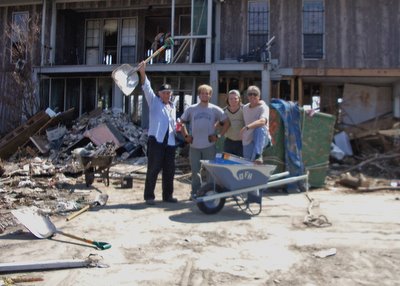 And for one man, it played a part in bringing hope.
And for one man, it played a part in bringing hope.
This photo is of a wheel barrow with the letters DFH painted on it. It is of three from Minneapolis (actually, one from Switzerland via Minneapolis) who helped a man in Pearlington haul away his ruined possessions. It is of this man standing in front of what's left of his home. And it is this one who has lost so much who is lifting high the shovel used to throw out his mud caked belongings. I would call that hope ...delivered.
Help ...and Hope

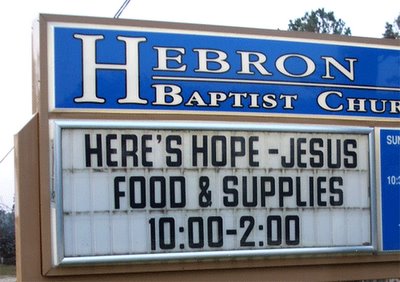
 .
. 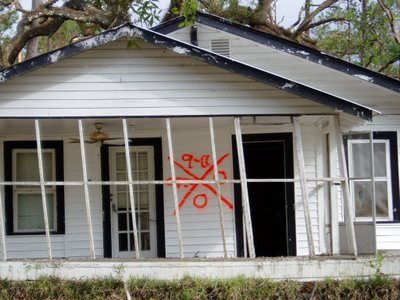 .
. .
.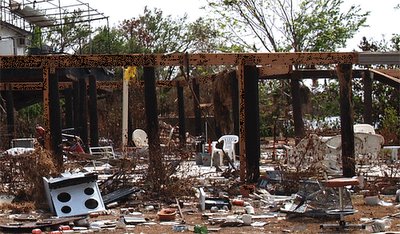

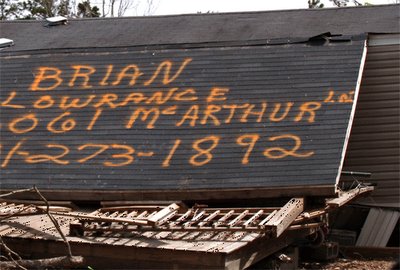
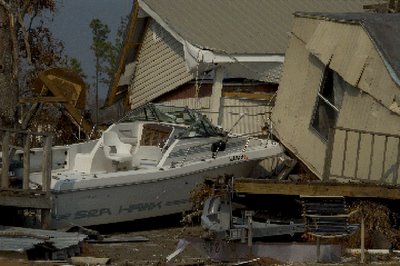
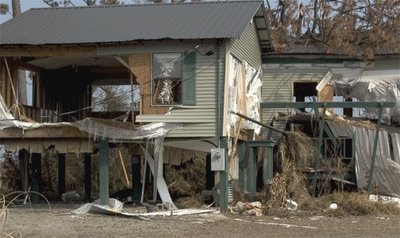
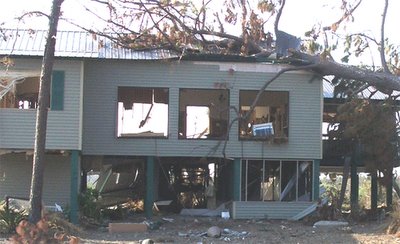

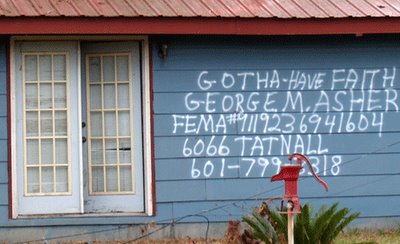 .
. .
.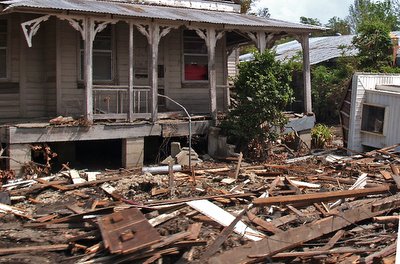 .
.
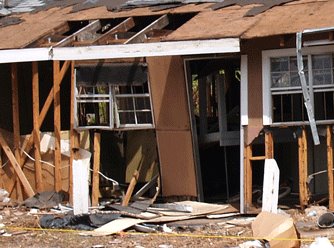

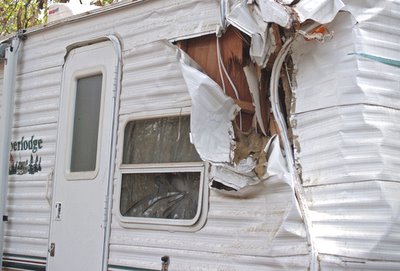
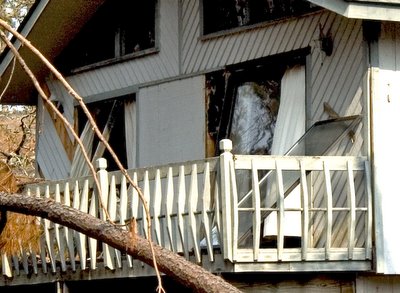

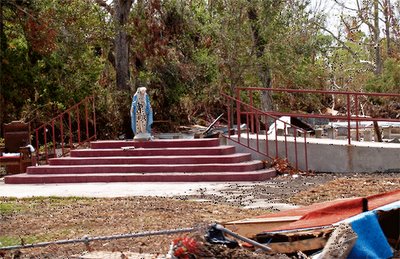
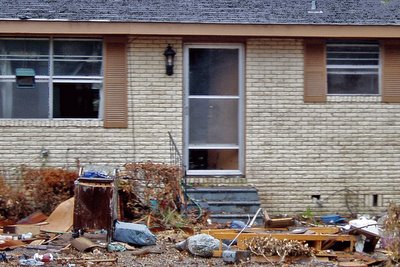 .
.






 And for one man, it played a part in bringing hope.
And for one man, it played a part in bringing hope. 


